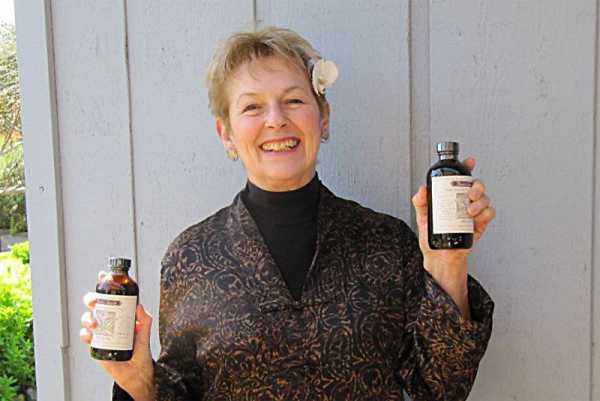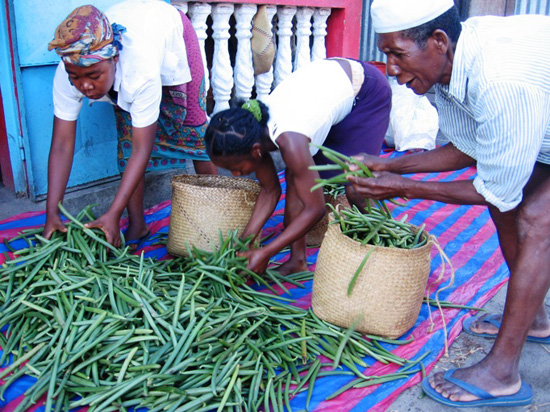
I'm amazed at how superior your vanilla is!
– Des, The Grommet
Since I first read about the earthquake two weeks ago tomorrow, each day I look to see if anything hopeful has been posted about Haiti. A country that before the earthquake has been overlooked and ignored by the world’s governments. Now the devastation and desperation is so great it is impossible to wrap my mind around what it must be like to be in Port Au Prince as a survivor or aid provider.
I have a friend, Anne Jordon Reynolds, who started a school in Coco Beach, far to the Northwest. It was the first school ever in the region. The families are beyond gratitude that their children have the opportunity to learn to read and write. The school is filled to capacity and there are three times as many children in the area who would like to attend school in too.
Anne is a professor at the University of Alabama. For the past decade she has engaged her students in volunteer work and work-for-credits to help the Haitians. Every holiday and school break she heads back with supplies and money she’s raised to help the community of Coco Beach and beyond.
We became friends when she asked if I could help her locate vanilla plants so that the local families, could have a cash crop to sell. I introduced her to my friend, David Gardella, an ex-USAID worker who has a farm in Costa Rica. He brought vanilla and cacao plants to Haiti and the community is working hard toward finally having an income in the countryside.
Two years ago, Anne arrived in Haiti just after one of the hurricanes that slammed into Haiti and just in time for a larger one that caused further destruction. She was there with a team of filmmakers who were documenting Haiti; the filmmakers saw far more hardship than they ever anticipated. Their experience impressed them enough to commit to long-term help. Easy to understand as the Haitians are very likable people who have endured great hardship and yet are resillient and resourceful.
Most recently, Anne and her daughter Stephanie were in Cap Haitien when the earthquake struck. Although they felt the earthquake, there was no damage 300 miles to the north of Port Au Prince. For the next ten days she and her daughter unloaded supplies from boats and helped in distribute supplies.
People managed to somehow sail or travel by land north from Port Au Prince, in dire need of medical care as well as food and water. Many were returning home to stay with relatives who at least have some sort of shelter and maybe enough rice and beans for a few more mouths. They worked in the city to help their destitute families in the countryside and are returning, themselves destitute.
Anne and Stephanie were finally able to fly out of Haiti last weekend, completely exhausted mentally and physically. Anne told me that it was impossible to sleep with the overwhelming need and suffering so great. In the next few days I will talk with Anne then share some of what I learnwith you and what we can do for Haiti in the short – and long- term.
Americans are probably the most generous people in the world when it comes to donating money to others in need. We raised a remarkable amount of money in a very short period of time via Twitter, Facebook, cell phones and computers.
And then we watched in shock as we learned that help we paid for wasn’t making it to those in need. Indeed, it has been two weeks since the earthquake and some people have had barely any food or water and still have no shelter. We did our part: why is everything moving so slowly?
We forget that we live in an ultra fast-paced society with technology that assists us to do in real-time things that were unimaginable even ten or fifteen years ago. But when it comes to logistics such as sailing a medical supply ship into a completely ruined port or landing a planeload of emergency medical supplies at an airport set up to take maybe 30 flights a day max under the best possible circumstances, life moves at human speed, not the speed of technology.
The Haitian government’s organizational abilities before the earthquake were limited. The president is now running the government out of a tent. There was no infrastructure to oversee the unloading of ships and planes and getting supplies where they were needed. While things are slowly falling into place, humans can only work so many hours without sleep and without the tools to make things happen. That we were able to get help to some people within days is actually remarkable when you consider the magnitude of the situation. Sadly, there is no way that things could be fast enough to reach more than a million desperate people.
What we can all offer to the Haitians — and to all the people who are there to help — is our compassion and love. Many of us would call this prayer. If prayer is an uncomfortable concept, think of it simply as thought. Thought and prayer are a form of energy. We each have the capacity to send positive energy to others. A moment in the morning when we waken; a moment in the evening before we go to sleep. So simple. So powerful.
I was given a small bottle of Rain’s Choice in a gift basket and I have been hooked ever since. The flavor makes all of my baking so much better! I will never use grocery store vanilla again!


© 2021. All Rights Reserved
Designed/Developed by Kat & Mouse